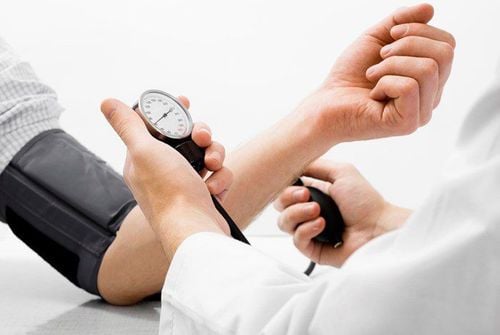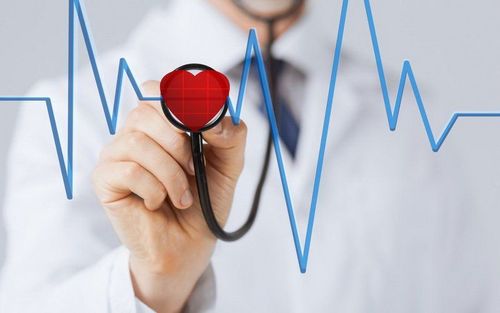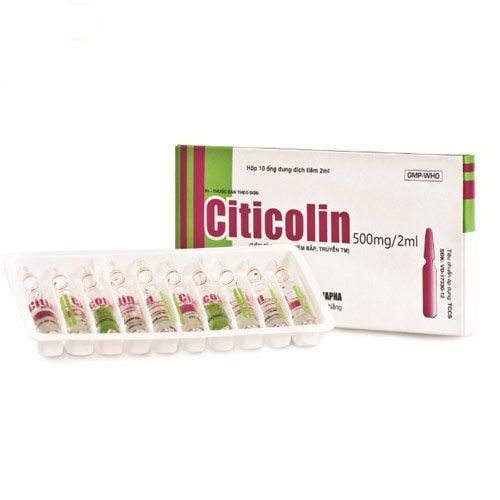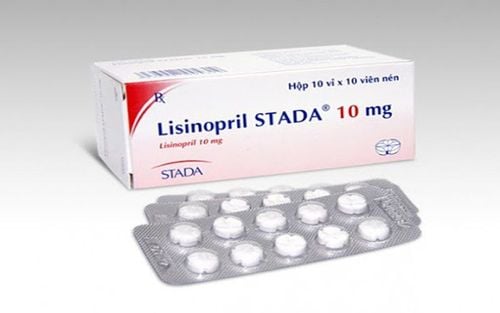This is an automatically translated article.
High blood pressure is a dangerous cardiovascular disease that is considered a "silent killer" because the entire progression of the disease often takes place in silence with no symptoms. Currently, Vietnam has about 12 million people infected, meaning that on average, 1 in 5 adults has the disease. In 2016, this rate was at an alarming rate with more than 40% of adults suffering from hypertension.So what are the symptoms, causes and treatment of high blood pressure? People's doctor, senior doctor Doan Du Dat, Vinmec Ha Long General Hospital will help you answer these questions.
1. What is high blood pressure?
High blood pressure (or hypertension) is a chronic disease where the pressure of the blood against the walls of the arteries is too high. High blood pressure puts a lot of pressure on the heart (increases the burden on the heart) and is the cause of many serious cardiovascular complications such as: cerebrovascular accident, heart failure, coronary heart disease, myocardial infarction. ,...Some major types of high blood pressure, including:
Essential hypertension (or primary, hypertensive disease): no specific cause, accounting for 90% of cases; Secondary hypertension (High blood pressure is a symptom of some other disease): Associated with some diseases of the kidneys, arteries, heart valve disease and some endocrine diseases; Isolated systolic hypertension: When only systolic blood pressure rises while diastolic blood pressure is normal; Hypertension in pregnancy, including gestational hypertension and pre-eclampsia: Warning for some cardiovascular risks during pregnancy. With high blood pressure, the blood pressure circulating in the arteries increases, putting more pressure on the tissues and causing damage to the blood vessels over time.
Trắc nghiệm: Bạn có hiểu đúng về huyết áp cao không?
Huyết áp cao còn được gọi là kẻ giết người thầm lặng vì bệnh thường không có triệu chứng. Thiếu hụt kiến thức về huyết áp cao có thể làm cho tình trạng bệnh trở nên trầm trọng hơn. Dưới đây là những câu hỏi trắc nghiệm vui giúp bạn hiểu đúng về bệnh cao huyết áp.2. What is high blood pressure?
As mentioned above, blood pressure is the pressure of the blood against the artery walls. Blood pressure is determined based on 2 indicators (Systolic blood pressure / Diastolic blood pressure):Systolic blood pressure (corresponding to the stage of heart contraction): Has a higher value due to the blood flow in the arteries. The pulse is now being pushed by the heart. Diastolic blood pressure (corresponding to the relaxation period between two consecutive heartbeats): Lower value because the blood vessels are not now under pressure to eject blood from the heart. To answer the question "How much is high blood pressure", a series of treatment guidelines from many countries, associations and leading scientists in the world have been released. The diagnosis and treatment strategies of cardiologists in our country often follow the updated treatment guidelines of the European Society of Cardiology (ESC). According to the recently updated ESC guidelines in 2018, depending on the severity, high blood pressure is classified as follows:
Optimal blood pressure: Less than 120/80 mmHg; Normal blood pressure: 120/80 mmHg or higher; High-normal blood pressure: 130/85 mmHg or higher; Grade 1 hypertension: 140/90 mmHg or higher; Grade 2 hypertension: 160/100 mmHg or higher; Grade 3 hypertension: 180/110 mmHg or higher; Isolated systolic hypertension: When systolic blood pressure is 140 mmHg or higher, while diastolic blood pressure is less than 90 mmHg Prehypertension when: Systolic blood pressure > 120-139 mmHg and diastolic blood pressure > 80- In addition, according to the Vietnam Heart Association, blood pressure below 120/80 mmHg is considered normal. When blood pressure is consistently 140/90 mmHg or higher, it is considered high blood pressure.
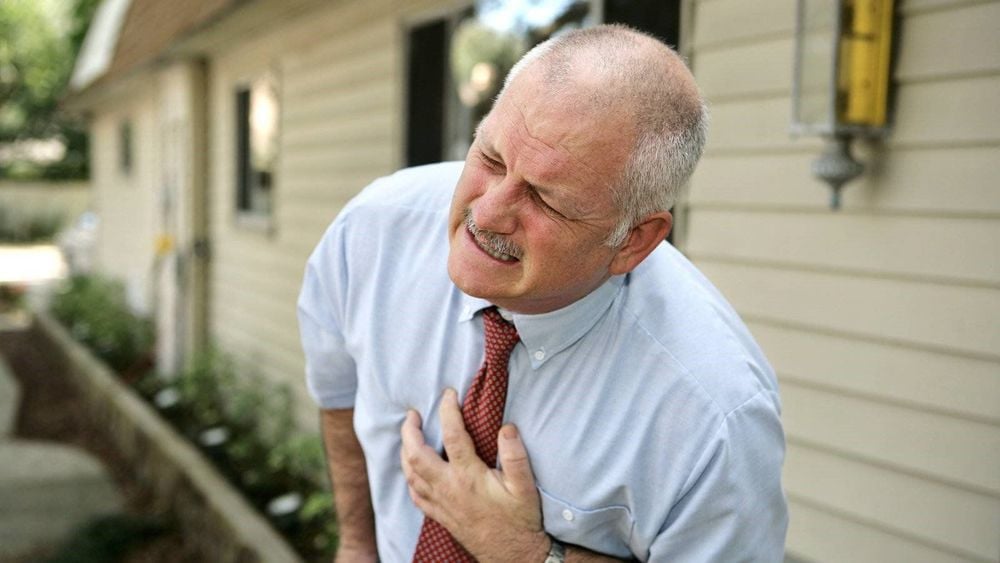
Cac huyết áp có thể gây ra nhiều biến chứng tim mạch nguy hiểm.
3. Symptoms of high blood pressure
Most of the symptoms of high blood pressure are mild. In fact, most hypertensive patients are unable to notice any obvious signs or symptoms, even though the disease is already quite advanced. A small number of patients with hypertension may present with transient symptoms such as headache, dyspnea, or, rarely, epistaxis.

Triệu chứng bệnh cao huyết áp thường không rõ ràng, chỉ được phát hiện khi bệnh nhân đến khám định kỳ hoặc khám một bệnh khác.
True to the name that many scientists have given the disease: High blood pressure is a "silent killer", the symptoms of the disease are not obvious and most do not occur until the disease has progressed. to a very serious stage. At this time, cardiovascular complications can suddenly appear and take the patient's life in the blink of an eye.
4. Causes of high blood pressure
As mentioned, most cases of hypertension have no known cause and are called essential hypertension. This type is usually genetic, more common in men.
Besides, secondary high blood pressure is the result of some medical conditions such as kidney disease, thyroid disease, adrenal tumor or effects caused by birth control pills, cold medicine, cocaine, alcohol, tobacco. . This type accounts for only about 5-10% of all high blood pressure cases. Definitive treatment of secondary causes can resolve the disease. For high blood pressure caused by an unwanted side effect of the drug, it can take several weeks after stopping the drug for blood pressure to return to normal. In children, especially those under the age of 10, with secondary hypertension, the cause is often another disease, such as kidney disease.
Gestational hypertension is a simple form of hypertension that usually occurs after the 20th week of pregnancy. Meanwhile, preeclampsia also occurs after 12 weeks of pregnancy, but is accompanied by edema and protein in the abdomen. urine. Causes of these forms of hypertension during pregnancy can be severe anemia, excessive amniotic fluid, pregnancy with the first child, multiple pregnancies, young women under 20 years old or older than 35 years old, history high blood pressure or diabetes,...
5. Who is at risk for high blood pressure?
The following are some common subjects of high blood pressure:
Older people: The blood vessel wall system can no longer maintain its elasticity as before, leading to high blood pressure; Gender: The proportion of men under 45 years old is higher than that of women, however, postmenopausal women are more likely to have high blood pressure than men of this age; Family history: The risk of developing high blood pressure is usually higher for family members (parents or siblings) with a history of cardiovascular disease. The following factors increase the risk of high blood pressure, including:
Being overweight; Sedentary lifestyle, inactivity; Eating unhealthy; Eating too much salt; Abuse of alcohol, beer; Smoke; Frequent stress.
6. Treatment of high blood pressure
The goal of treatment for high blood pressure is to keep the patient's blood pressure within the acceptable range, usually below 140/90 mmHg for the overall blood pressure goal. However, for patients with high blood pressure with associated conditions such as diabetes or chronic kidney disease, a more rigorous course of treatment will be recommended to keep blood pressure stable below 130. /80 mmHg. Note that target blood pressure levels may vary from patient to patient. Here are the treatments for high blood pressure:
Các mức huyết áp mục tiêu có thể khác nhau theo từng đối tượng bệnh nhân cụ thể.
6.1. Lifestyle change
Non-drug measures always play an extremely important role in the general treatment process. On the advice of doctors, patients can control blood pressure by:Adjust diet: Healthier and use less salt (less than 6g/day); Exercise regularly and moderately; Try to maintain an ideal weight, lose weight according to the instructions; Stop or minimize alcohol consumption, quit smoking; Avoid sudden colds; Well control related diseases; Use medications to treat high blood pressure exactly as directed by your doctor; Regularly monitor blood pressure changes at home with an appropriate monitor.
6.2. Medicines for high blood pressure
If lifestyle changes don't do much to improve your condition, your doctor may consider giving you a prescription medication.Although high blood pressure treatment regimens have been proposed and tested many times. However, throughout the course of the disease, the doctor will monitor and may change, increase or decrease the dose, combine more drugs or remove drugs until the most suitable treatment regimen is determined for the patient. patient. Please note the health situation before and after taking the drug to inform the doctor about unwanted effects while taking the drug according to the regimen. Take medicine regularly to stabilize blood pressure. Treatment of hypertension is lifelong treatment. Do not arbitrarily stop treatment, it is necessary to consult a specialist.
Besides, high blood pressure can also be well controlled with antihypertensive drugs under the guidance of traditional medicine doctors.
6.3. Treating high blood pressure in an emergency
Some high blood pressure emergencies require immediate treatment in the emergency room or intensive care unit, as the risk of death is high. The patient may be given oxygen and emergency antihypertensive medication to quickly improve the situation.Most of the cardiovascular diseases in our country, especially common chronic diseases such as high blood pressure, the problem of treatment adherence is always a headache for doctors. Because treatment often requires a combination of drugs, leading to patients forgetting to take medication, or having medication but not taking it, or taking medication not according to the doctor's instructions, as a result, the effectiveness of hypertension treatment is not effective. high. Therefore, patients need to be really serious about their own treatment, and work well with their doctors to maximize the effectiveness of treatment.
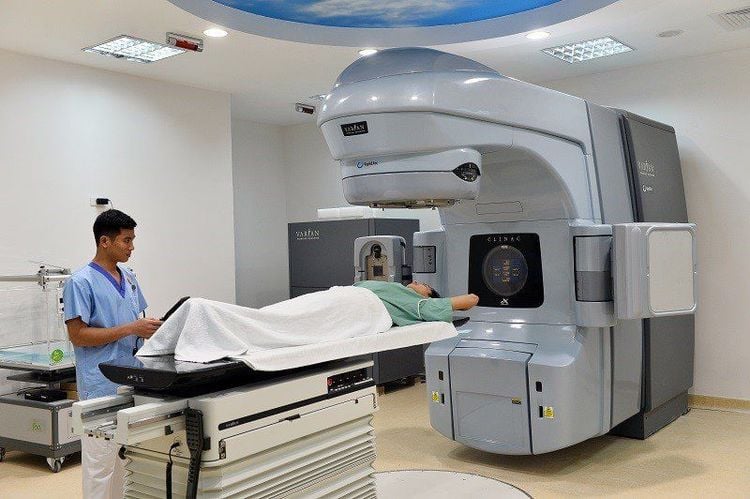
Cơ sở vật chất hiện đại tại Vinmec đã đem lại cơ hội sống cho nhiều bệnh nhân cao huyết áp.
Together with Vinmec protect you and your family against the risks of complications from high blood pressure.
Please dial HOTLINE for more information or register for an appointment HERE. Download MyVinmec app to make appointments faster and to manage your bookings easily.






